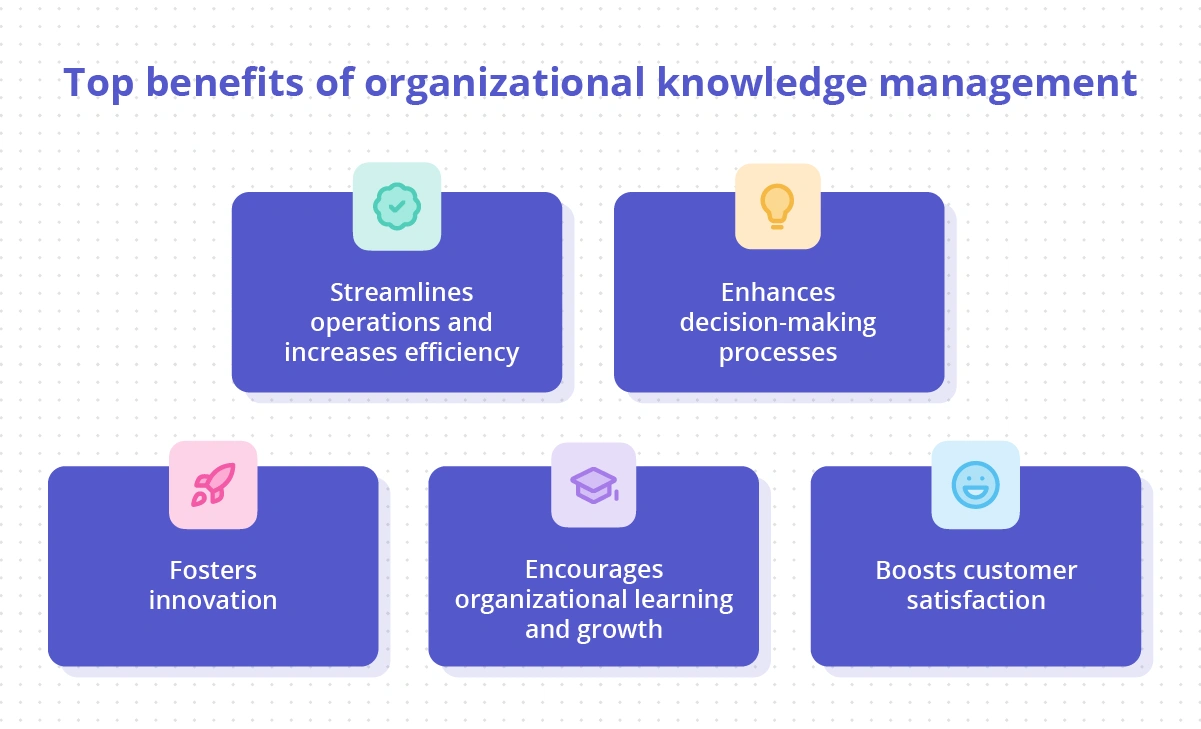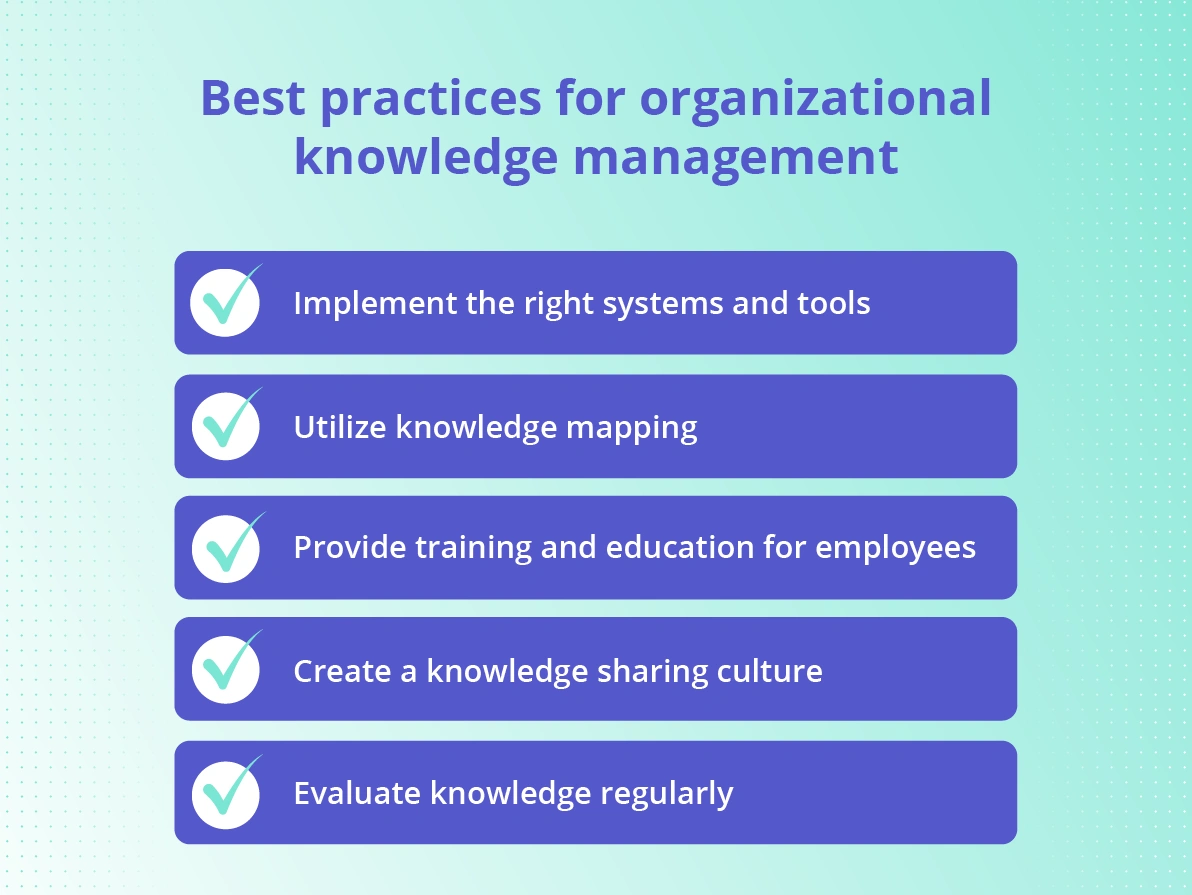Organizational knowledge management, an integral facet of contemporary business operations, plays a pivotal role in shaping enterprises globally. The concept essentially focuses on creating, sharing, using, and managing an organization's knowledge and information. It is a business strategy and knowledge governance strategy that conjoins core aspects of information systems, strategic management, and human resource management, working synergistically to bolster organizational efficiency and competitiveness.
75% of companies believe organizational knowledge management is important for their corporate strategy yet only 25% have a company-wide approach to knowledge management. For this reason, it is vital for companies seeking to boost performance to utilize organizational knowledge management by aligning their knowledge resources better.
It is an intricate blend of both internal knowledge—the information built over the years from various transactions—and external knowledge that a saleable entity absorbs from industry trends, customer preferences, and other outside influences.
What is a organizational knowledge management
Organizational knowledge management begins with the collection and documentation of data and information within a company. However, simply having this information on hand is not sufficient; it must be successfully communicated and applied. This is where organizational knowledge management truly comes into its own, transforming raw data into actionable insight.
Organizational knowledge encapsulates a vital, often intangible resource, encompassing the skills, experiences, and understanding held collectively by a company's employees. Unlike physical resources, organizational knowledge is expansible and fostered through learning and innovation. Its effective management can yield significant improvements in decision-making processes, agility in market adaptation, and other pivotal business operations.
Fundamentally, organizational knowledge management acts as a mechanism to capture intelligence and expertise, disseminating it across the firm, and integrating it into company processes, products, or services. The objective is to facilitate the best use of that knowledge and maximize organizational capabilities. Through this approach, the business not only safeguards its intellectual capital but can also spur innovation, enhance customer value, and establish a robust competitive advantage in the dynamic corporate environment.
Challenges in organizational knowledge management
An efficacious knowledge management serves as the bedrock of optimization, making invaluable contributions to productivity, sustainable growth, and ultimately, business success. Yet, the task of implementing robust knowledge management strategies is not devoid of hurdles that could impede progress.
Lack of efficient systems for knowledge capture
Over 40% of companies believe that knowledge management has helped them avoid business disruptions, yet a primary challenge of organizational knowledge management is the lack of consistent and efficient systems for knowledge capture. This often leads to the loss of useful information. Another common bottleneck in knowledge management lies in the entanglement of unstructured data. Such labyrinthine muddle often leads to inefficiencies, errors, and imprecision.
For the issue of knowledge capture, organizations could adopt sophisticated data capturing tools, which aid in information consolidation.
Difficulty retaining and distributing knowledge
85% of employees express the need for better access to knowledge and expertise in their organizations why is why knowledge retention poses another predicament. When skilled workers depart an organization, their tacit knowledge often walks out the door with them. Additionally, the challenge of knowledge distribution further compounds existing issues. It's one thing to aggregate information, but aptly sharing it across an organization often proves a more daunting task.
To combat the issue of knowledge retention, it becomes crucial to establish a culture of knowledge sharing within the organization. Regular training, workshops, and mentorship programs can help mitigate the loss of tacit knowledge.
For the challenge of knowledge distribution, companies could utilize collaborative digital platforms, which ensure effortless sharing of information across various quarters of an organization.
The framework of effective organizational knowledge management
The framework of organizational knowledge management is a crucial strategic tool for any successful business in our information-centric world. The significance of organizational knowledge management is often underestimated, but a well-structured, coherent system can substantially boost efficiency and competitiveness. As companies deal with a deluge of information each day, utilizing this resource correctly determines whether an organization thrives or merely survives.
The organizational knowledge management framework is designed to capture, store, and effectively use the collective knowledge of a firm. In the modern world, where data-driven decision-making is paramount, the significance of an excellent knowledge management structure is undeniable. It aids in consolidating and categorizing information in an accessible manner so that the right information reaches the right individual at the right time, driving informed decisions that propel the organization towards its objectives.
For those seeking to reap maximum value from their organizational knowledge, having a well-established knowledge management framework is not an option but a necessity. The structure guides the flow of knowledge, allowing the organization to unleash its full potential. A good organizational knowledge management framework not only leads to streamlined operations and enhanced decision-making but also promotes continuous learning and innovation.
Types of organizational knowledge management
Organizational knowledge management constitutes an extensive aspect in running a corporation. It brings together the integral work of employees, systems, practices, and strategies for the intended benefit of the organization's success. This knowledge management aids organizations to generate, organize, store, share, and utilize the information practiced and developed within the organization. Organizational knowledge management, hence, serves as the key to creating a competitive advantage for businesses of varying sizes.
Explicit knowledge
The primary form of organizational knowledge management is explicit knowledge. It refers to knowledge quoted and communicated among individuals and stored formally. This formal disposition may be in the form of manuals, rules, procedures, or databases. Visual information related to market trends, product designs, customer feedback or sales records, are all aspects of explicit knowledge. This form of knowledge management is typically systematic, exerting a structure to allow easy retrieval, application, and transfer of information.
Tacit knowledge
Tacit knowledge stands distinct due to its intangible nature, hence making it difficult to quantify or represent. It is often individual, gained through personal experiences, insights, and observations. It can be values, understandings, insights or instincts that an individual uses to make decisions and predict outcomes. It is helpful in innovative problem-solving, as it relies heavily on an individual's skills and experience. Tacit knowledge is communicated primarily through personal contact and shared experience.
Embedded knowledge
A third form of organizational knowledge management, embedded knowledge, is oftentimes overlooked. This is due to its existence within the systems, routines, procedures, and structures of an organization. The management of embedded knowledge requires a comprehensive understanding of an organization’s practices, methodologies, and heuristics. Since embedded knowledge is reliant on an organization’s procedures and structure, it is deeply ingrained in the fabric of the company. This often results in a higher retention rate of knowledge, even as individuals within the organization change.
Top benefits of organizational knowledge management
Organizational knowledge management offers an array of advantages to organizations that effectively implement it. Business landscapes are becoming more competitive and complex, making it critical for organizations to leverage the collective knowledge and expertise of their employees to remain competitive. It is here that the importance of organizational knowledge management comes to the fore.
Streamlines operations and increases efficiency
When organizations have good knowledge management practices, such as through knowledge management automation, they are better equipped to eliminate unnecessary work, streamline processes, and reduce costs. It is through this reduction of unnecessary tasks and the enhancement of processes that organizations can experience increased efficiencies and profitability. Furthermore, the ability to quickly access and deploy critical information and knowledge enables organizations to stay agile and responsive to changing market dynamics.
Enhances decision-making processes
Through effective attainment, organization, and utilization of knowledge, businesses can make well-informed decisions that enable them to stay ahead in their respective industries. This, therefore, acts as a catalyst for the organization’s growth and prosperity.
Fosters innovation
Through effective organizational knowledge management, businesses can stimulate creativity and innovation among their employees. Employees can tap into the organization's collective wisdom, enabling them to take smarter risks and innovate with confidence. This sharing and distribution of knowledge ensures a ready pool of ideas that can be leveraged for the development of novel products or service delivery modalities, ensuring the organization remains ahead of the curve in a constantly evolving marketplace.
Encourages organizational learning and growth
By continually sharing and reusing knowledge, an organization can create a culture of constant learning and improvement. This not only enhances the skills and abilities of individual members but also propels the growth of the organization as a whole. Moreover, it ensures that the knowledge base of the organization is continually updated and enriched, preventing knowledge loss due to employee turnover.
Boosts customer satisfaction
Customer interactions form a wealth of knowledge that can be used to enhance service delivery, product development, and overall customer experience. By creating and managing a knowledge base of customer interactions, feedback, and other related information, organizations can better anticipate and meet the needs and expectations of their customers, leading to increased satisfaction and loyalty.

5 best practices for optimal organizational knowledge management
By implementing best practices in organizational knowledge management, businesses can be assured of effective decision-making, improved services, innovative ideas, and an overall competitive edge in the market.
Implement the right systems and tools
Knowledge management systems (KMS), data analytics tools, and cloud-based platforms help centralize data, simplify access to information, and foster innovation, yet over 33% of companies believe their knowledge management software is outdated or obsolete. The right technologies provide a platform for cataloging, developing, retrieving, and disseminating information in real-time, promoting efficiency and productivity.
Utilize knowledge mapping
Knowledge mapping involves visually organizing knowledge to make it easily accessible to all members. A comprehensive knowledge mapping process includes identifying key areas of knowledge, pinpointing knowledge sources, and determining knowledge gaps. Effective knowledge maps ensure that critical information does not fall through the cracks and that employees can seek out the expertise they need.
Provide training and education for employees
Equipped with the necessary skills, employees can accurately utilize knowledge management tools and contribute effectively to knowledge capturing, sharing, and usage. Training programs should aim to stimulate active participation and openness to learning amongst employees, thereby enabling them to take full advantage of the knowledge resources.
Create a knowledge sharing culture
A supportive environment embracing the habit of exchanging information facilitates smoother operations and enhances collaboration. To establish this, organizations should promote open communication, recognize and reward knowledge sharing, and inculcate a sense of trust amongst employees.
Evaluate knowledge regularly
The process of knowledge evaluation offers a way to assess the content's relevance, quality, and utility. This practice addresses the problem of information overload and removing outdated or irrelevant data. Regular audits and employee feedback are some robust strategies to ensure the current knowledge remains relevant and valuable.

Getting started with organizational knowledge management
Organizational knowledge management merges the individual and collective learning experiences within a company into a structured system of insights and practices. This enables organizations to leverage both internal and external knowledge, leading to improved decision-making, productivity, and overall market competitiveness.
While the theory behind organizational knowledge management might be intricate, its essence is straightforward: determine what your business knows, organize this knowledge, and employ it strategically to drive organizational performance.
To learn more about how your business can manage and leverage organizational knowledge, explore our features page.



